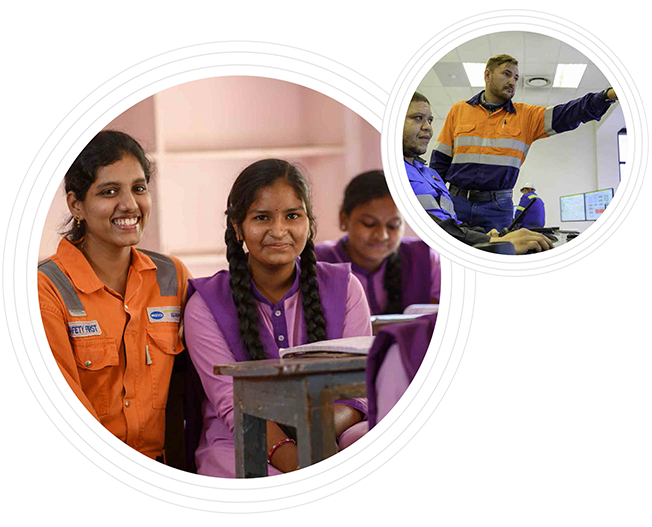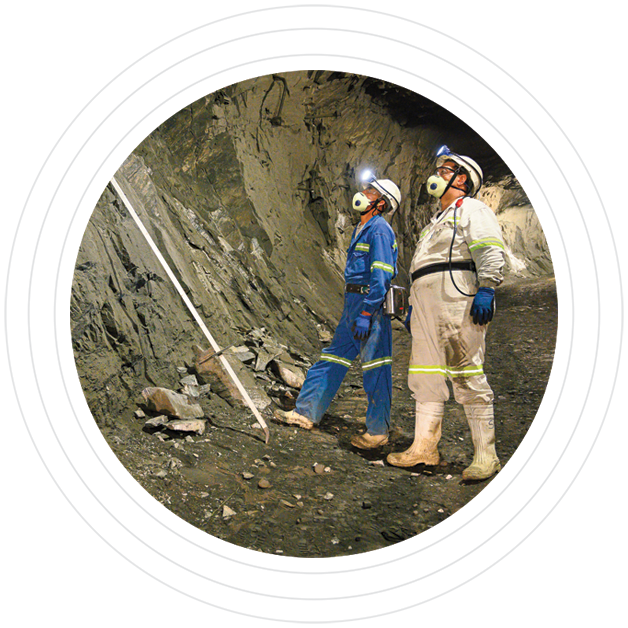Responsible supply chain
management
Vedanta’s procurement spend for FY2022 is ~`700 billion. With such a large spend base responsible supply chain management is critical to our transformation mission. It helps mitigate financial risk, sustain our commitment to ethical business and compliance, and meet our commitments to our customers and other stakeholders. All our significant suppliers are required to have an adequate system in place to address the human rights concerns of their workforce. We regularly undertake inspections and audits of all our key suppliers and problematic issues are communicated to the contractor. We undertake sustainability screening on human rights and child labour, environment and labour aspects for all new suppliers and contractors. This is followed up with induction sessions to familiarise them with our sustainability policies, standards and systems.

2,319
SUPPLIERS SCREENINGS
CONDUCTED IN FY2022
Our Supplier Code of Conduct (SCOC) serves as the guiding document for all our interactions with suppliers and vendors. It is mandatory for all our suppliers to abide by the Code. The SCOC covers aspects related to labour and human rights apart from Health, Safety, Environment & Sustainability and so on. Our Supplier and Contractor Sustainability Management Policy helps us implement human rights practices across the supply chain. Through this code and policy, we ensure that our suppliers comply with all the relevant legislation including labour and human rights laws. Periodic inspections are conducted at our remote mine locations to check proof of age for all our contract workers while radiological age identification process is used to access child labour violations, if any.
Suppliers are integral to our business and help us maintain efficiency and responsible conduct by creating reliable and sustainable supply chain. Our BUs have a supply chain strategy that sets clear priorities for the vendors they engage with.
| Procurement budget | FY2022 | ||
|---|---|---|---|
| INR Million | % spend | ||
| Total procurement spent | 769,572 | ||
| Total procurement spent on suppliers belonging to same country |
635,227 | 82.54 | |
| Total procurement spent on suppliers belonging to same state |
358,554 | 46.59 | |
| Total procurement spent on suppliers belonging to same district |
95,385 | 12.39 | |
By 2025:
- Ensure that 100% of our new business partners have ISO 45001 or equivalent
- Ensure that 50% of our procurement comes from local vendor
- 100% long-term Tier 1 suppliers to submit their GHG reduction strategies
Critical suppliers
Critical suppliers have a significant impact on our production, costs and/or revenues in the event of an interruption in our supply chain and are thus important to us. They are also critical due to the potential risk and impact of their products.
Supplier Classification
ABC Supplier classification
Suppliers are classified as critical and non-critical based on five dimensions under ABC framework:
- Business outcome
- Spend (value/volume)
- Critical business operation
- Sensitivity
- Substitutability
A” category suppliers are critical suppliers for our business.
7,841
TOTAL SUPPLIERS
749
CRITICAL TIER SUPPLIERS
1,406
CRITICAL NON-TIER
69%
SHARE OF TOTAL PROCUREMENT SPENT ON CRITICAL TIER-1 SUPPLIERS
Evaluation criteria for our business partners include:
- Historical financial performance
- Management capability, including the ability to meet regulatory requirements
- Stability and scale of their business operations
- Quality of the product/service offered
- Ability to adhere to our Supplier Code of Conduct - including HSE criteria, MSA (Modern Slavery Act) compliance, environmental compliance.
- Adherence to timelines and continuity of delivery
- Collaborating with new-age innovative start-ups
- Capacity building around best industrial practices
We are committed to conducting business only with those business partners who can align with the Company’s supply chain management strategy. It is mandatory for all our suppliers to sign our Supplier Code of Conduct, committing to a safe and healthy working environment for their employees and compliance with social and environmental regulations applicable in the respective regions. We ensure that while our suppliers help us meet our business objectives and targets, there is no compromise on quality or safety.
Supply chain risk
We have a systematic approach to identify potential sustainability risks in our supply chain. Risks in health, safety and environment (HSE) area and human rights are considered significant risks, given their potential to impact business continuity. While screening potential suppliers, we consider their performance on HSE and human rights by assessing them against set criteria that includes their commitment to HSE, along with necessary policies to support the commitment. We also consider the standards, roles and responsibilities of critical role holders. We also require our suppliers to declare their compliance with Modern Slavery Act. We engage third-party to conduct risk assessment of our suppliers on various aspects related to regulatory compliance and compliance with MSA (Modern Slavery Act).

Definition of sustainability high-risk
At Vedanta, risk is a factor of likelihood of occurrence and its severity (Guidance note GN07 - Risk assessment). Using this definition, we have categorised our suppliers to reflect their risk potential for themselves and for us. Suppliers falling under the below categories:
- Suppliers from countries, which have the likelihood of incidence of slave labour/child labour.
- Suppliers not having adequate safety trainings in place for their workforce.
- Suppliers lacking a concrete policy on human rights, fair wages, proper working conditions,
- Suppliers having Environment, Social and Governance misconduct that have resulted in disruption to their business operations are classified as high-risk suppliers for the business
7,591
TOTAL SUPPLIERS
1,372
SUPPLIERS ASSESSED IN THE LAST THREE
YEARS FOR RISK EXPOSURE
149
SUPPLIERS CLASSIFIED AS HIGH RISK
ADDRESSING HUMAN RIGHTS
CONCERNS IN THE SUPPLY CHAIN
Responsible supply chain management helps us avoid human rights-related risks in our supply chain. All our significant suppliers are required to have an adequate system in place to address the human rights concerns of their workforce. We regularly undertake inspections and audits of all our key suppliers and problematic issues are communicated to the contractor. We undertake sustainability screening on human rights and child labour, environment and labour aspects for all new suppliers and contractors. This is followed up with induction sessions to familiarise them with our sustainability policies, standards and systems.
Our Supplier Code of Conduct (SCOC) serves as the guiding document for all our interactions with suppliers and vendors. It is mandatory for all our suppliers to abide by the Code. The SCOC covers aspects related to labour and human rights apart from Health, Safety, Environment & Sustainability, and so on. Our Supplier and Contractor Sustainability Management Policy helps us implement human rights practices across the supply chain. Through this code and policy, we ensure that our suppliers comply with all the relevant legislation including labour and human rights laws. Periodic inspections are conducted at our remote mine locations to check proof of age for all our contract workers while radiological age identification process is used to access child labour violations, if any.
2,391
SUPPLIER SCREEN
CONDUCTED IN FY2022
